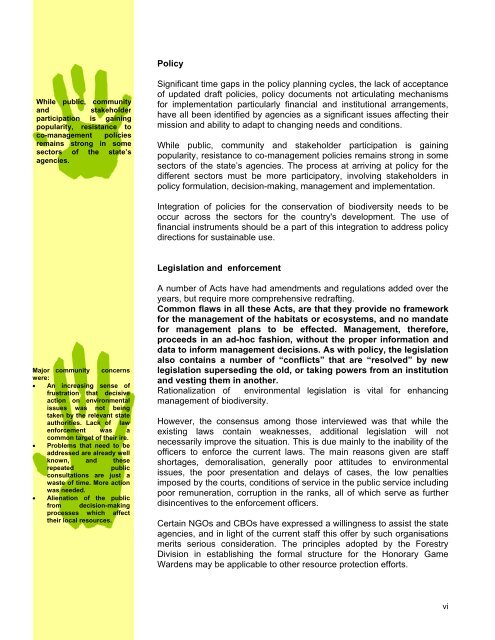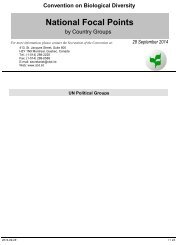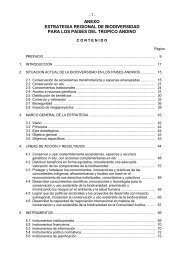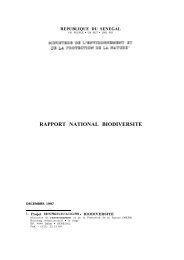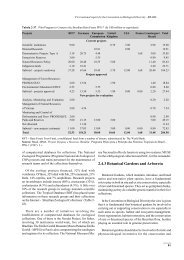English version (PDF) - Convention on Biological Diversity
English version (PDF) - Convention on Biological Diversity
English version (PDF) - Convention on Biological Diversity
You also want an ePaper? Increase the reach of your titles
YUMPU automatically turns print PDFs into web optimized ePapers that Google loves.
Policy<br />
While public, community<br />
and<br />
stakeholder<br />
participati<strong>on</strong> is gaining<br />
popularity, resistance to<br />
co-management policies<br />
remains str<strong>on</strong>g in some<br />
sectors of the state’s<br />
agencies.<br />
Significant time gaps in the policy planning cycles, the lack of acceptance<br />
of updated draft policies, policy documents not articulating mechanisms<br />
for implementati<strong>on</strong> particularly financial and instituti<strong>on</strong>al arrangements,<br />
have all been identified by agencies as a significant issues affecting their<br />
missi<strong>on</strong> and ability to adapt to changing needs and c<strong>on</strong>diti<strong>on</strong>s.<br />
While public, community and stakeholder participati<strong>on</strong> is gaining<br />
popularity, resistance to co-management policies remains str<strong>on</strong>g in some<br />
sectors of the state’s agencies. The process at arriving at policy for the<br />
different sectors must be more participatory, involving stakeholders in<br />
policy formulati<strong>on</strong>, decisi<strong>on</strong>-making, management and implementati<strong>on</strong>.<br />
Integrati<strong>on</strong> of policies for the c<strong>on</strong>servati<strong>on</strong> of biodiversity needs to be<br />
occur across the sectors for the country's development. The use of<br />
financial instruments should be a part of this integrati<strong>on</strong> to address policy<br />
directi<strong>on</strong>s for sustainable use.<br />
Legislati<strong>on</strong> and enforcement<br />
Major community c<strong>on</strong>cerns<br />
were:<br />
• An increasing sense of<br />
frustrati<strong>on</strong> that decisive<br />
acti<strong>on</strong> <strong>on</strong> envir<strong>on</strong>mental<br />
issues was not being<br />
taken by the relevant state<br />
authorities. Lack of law<br />
enforcement was a<br />
comm<strong>on</strong> target of their ire.<br />
• Problems that need to be<br />
addressed are already well<br />
known, and these<br />
repeated<br />
public<br />
c<strong>on</strong>sultati<strong>on</strong>s are just a<br />
waste of time. More acti<strong>on</strong><br />
was needed.<br />
• Alienati<strong>on</strong> of the public<br />
from decisi<strong>on</strong>-making<br />
processes which affect<br />
their local resources.<br />
A number of Acts have had amendments and regulati<strong>on</strong>s added over the<br />
years, but require more comprehensive redrafting.<br />
Comm<strong>on</strong> flaws in all these Acts, are that they provide no framework<br />
for the management of the habitats or ecosystems, and no mandate<br />
for management plans to be effected. Management, therefore,<br />
proceeds in an ad-hoc fashi<strong>on</strong>, without the proper informati<strong>on</strong> and<br />
data to inform management decisi<strong>on</strong>s. As with policy, the legislati<strong>on</strong><br />
also c<strong>on</strong>tains a number of “c<strong>on</strong>flicts” that are “resolved” by new<br />
legislati<strong>on</strong> superseding the old, or taking powers from an instituti<strong>on</strong><br />
and vesting them in another.<br />
Rati<strong>on</strong>alizati<strong>on</strong> of envir<strong>on</strong>mental legislati<strong>on</strong> is vital for enhancing<br />
management of biodiversity.<br />
However, the c<strong>on</strong>sensus am<strong>on</strong>g those interviewed was that while the<br />
existing laws c<strong>on</strong>tain weaknesses, additi<strong>on</strong>al legislati<strong>on</strong> will not<br />
necessarily improve the situati<strong>on</strong>. This is due mainly to the inability of the<br />
officers to enforce the current laws. The main reas<strong>on</strong>s given are staff<br />
shortages, demoralisati<strong>on</strong>, generally poor attitudes to envir<strong>on</strong>mental<br />
issues, the poor presentati<strong>on</strong> and delays of cases, the low penalties<br />
imposed by the courts, c<strong>on</strong>diti<strong>on</strong>s of service in the public service including<br />
poor remunerati<strong>on</strong>, corrupti<strong>on</strong> in the ranks, all of which serve as further<br />
disincentives to the enforcement officers.<br />
Certain NGOs and CBOs have expressed a willingness to assist the state<br />
agencies, and in light of the current staff this offer by such organisati<strong>on</strong>s<br />
merits serious c<strong>on</strong>siderati<strong>on</strong>. The principles adopted by the Forestry<br />
Divisi<strong>on</strong> in establishing the formal structure for the H<strong>on</strong>orary Game<br />
Wardens may be applicable to other resource protecti<strong>on</strong> efforts.<br />
vi


